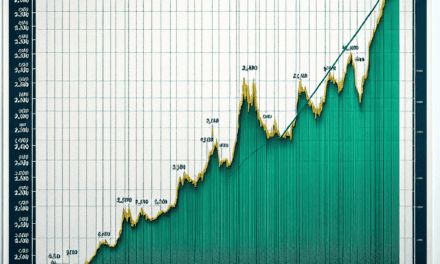“Trump Media CFO Eyes $13 Million DJT Share Sale: Strategic Move or Market Signal?”
Introduction
Trump Media & Technology Group’s Chief Financial Officer is reportedly planning to sell up to $13 million worth of shares in Digital World Acquisition Corp. (DWAC), the special purpose acquisition company (SPAC) set to merge with Trump Media. This move comes amid ongoing scrutiny and regulatory challenges facing the merger, which aims to take Trump Media public. The planned sale of shares highlights the financial maneuvers within the company as it navigates the complexities of the SPAC process and the volatile media landscape.
Impact of CFO’s Decision on Trump Media’s Financial Stability
The recent announcement by the Chief Financial Officer (CFO) of Trump Media & Technology Group to sell up to $13 million in shares of Digital World Acquisition Corp (DWAC), the special purpose acquisition company (SPAC) set to merge with Trump Media, has sparked considerable discussion regarding the potential impact on the company’s financial stability. This decision comes at a critical juncture as Trump Media is navigating the complexities of merging with DWAC, a move that is expected to provide the necessary capital infusion to support its ambitious growth plans. The CFO’s decision to liquidate a significant portion of shares raises questions about the underlying motivations and the potential implications for the company’s financial health.
To begin with, the sale of such a substantial amount of shares by a high-ranking executive could be interpreted in various ways. On one hand, it might be seen as a routine financial decision, possibly driven by personal financial planning or diversification strategies. Executives often sell shares for reasons unrelated to the company’s performance, such as tax obligations or personal liquidity needs. However, on the other hand, the timing of this sale could also be perceived as a lack of confidence in the company’s future prospects, especially given the pivotal stage of the merger process. This perception could potentially unsettle investors, leading to volatility in the stock price and affecting the overall market sentiment towards Trump Media.
Moreover, the sale of shares by a key executive might influence other stakeholders’ perceptions, including potential investors and partners. In the world of finance, confidence and perception play crucial roles in determining a company’s market value and its ability to attract investment. If stakeholders interpret the CFO’s decision as a signal of uncertainty or instability, it could hinder Trump Media’s efforts to secure additional funding or partnerships necessary for its expansion plans. This could, in turn, impact the company’s ability to compete effectively in the rapidly evolving media and technology landscape.
Furthermore, the financial stability of Trump Media is intricately linked to the successful completion of the merger with DWAC. The SPAC merger is expected to provide Trump Media with significant capital, which is essential for executing its strategic initiatives and scaling its operations. Any disruption or delay in this process could have adverse effects on the company’s financial health. Therefore, maintaining investor confidence and ensuring a smooth transition during the merger is paramount. The CFO’s decision to sell shares at this juncture adds an additional layer of complexity to an already intricate process.
In addition to these considerations, it is important to recognize the broader market dynamics and regulatory environment that could influence Trump Media’s financial stability. The SPAC market has experienced increased scrutiny from regulators, and any regulatory challenges could pose risks to the merger’s successful completion. Additionally, the media and technology sectors are characterized by rapid innovation and intense competition, necessitating substantial investment in technology and content to remain competitive. Trump Media’s ability to navigate these challenges while maintaining financial stability will be crucial to its long-term success.
In conclusion, the CFO’s decision to sell up to $13 million in shares of DWAC introduces a complex set of considerations for Trump Media’s financial stability. While the motivations behind the sale may be multifaceted, its impact on investor confidence and market perception cannot be overlooked. As the company moves forward with its merger plans, maintaining transparency and effectively communicating its strategic vision will be essential in ensuring continued support from investors and stakeholders. Ultimately, the successful execution of the merger and the ability to adapt to market dynamics will determine Trump Media’s financial trajectory in the coming years.
Market Reactions to the Sale of DJT Shares
The recent announcement that the Chief Financial Officer (CFO) of Trump Media & Technology Group plans to sell up to $13 million in shares of Digital World Acquisition Corp (DJT) has sparked significant interest and speculation within financial markets. This move, while not entirely unexpected, has prompted a variety of reactions from investors, analysts, and market observers. As the news circulates, it is essential to understand the potential implications of this sale and how it might influence the broader market dynamics.
To begin with, the decision by the Trump Media CFO to liquidate a substantial portion of DJT shares is seen by some as a strategic financial maneuver. It is not uncommon for executives to sell shares for reasons such as portfolio diversification, personal financial planning, or to capitalize on favorable market conditions. However, the timing and scale of this sale have led to questions about the underlying motivations and the potential impact on the company’s stock price. In the world of finance, such actions are often scrutinized for signals they might send about the company’s future prospects.
Moreover, the sale comes at a time when Digital World Acquisition Corp, a special purpose acquisition company (SPAC) that is set to merge with Trump Media, is under intense scrutiny. SPACs have been a popular vehicle for companies to go public, but they have also faced criticism for their lack of transparency and the speculative nature of their investments. The planned sale of DJT shares by a high-ranking executive could be interpreted as a lack of confidence in the company’s long-term growth potential, thereby influencing investor sentiment.
In addition to these considerations, the broader market context cannot be ignored. The stock market has been experiencing heightened volatility due to a variety of factors, including economic uncertainties, geopolitical tensions, and shifts in monetary policy. In such an environment, any significant insider transaction is likely to attract attention and potentially exacerbate market fluctuations. Investors may react by reassessing their positions, leading to increased trading volumes and potential price swings in DJT shares.
Furthermore, the sale of DJT shares by the Trump Media CFO may also have implications for the perception of the Trump brand in the business world. The Trump name carries significant weight and influence, and any financial decisions associated with it are closely watched. This transaction could be seen as a test of the brand’s resilience and its ability to weather potential challenges in the marketplace. As such, it may have a ripple effect on other ventures associated with the Trump name, influencing investor confidence and market behavior.
In conclusion, the planned sale of up to $13 million in DJT shares by the Trump Media CFO is a development that warrants careful consideration by market participants. While the motivations behind the sale may be multifaceted, its impact on investor sentiment and market dynamics is undeniable. As the situation unfolds, it will be crucial for investors to remain vigilant and consider the broader implications of this transaction within the context of an already volatile market environment. By doing so, they can make informed decisions that align with their financial goals and risk tolerance.
Analyzing the Timing of the CFO’s Share Sale
The recent announcement that the Chief Financial Officer (CFO) of Trump Media & Technology Group plans to sell up to $13 million in shares of Digital World Acquisition Corp (DWAC), the special purpose acquisition company (SPAC) set to merge with Trump Media, has sparked considerable interest and speculation. This move comes at a time when the financial and political landscapes are particularly volatile, raising questions about the timing and implications of such a significant sale.
To begin with, the decision to sell shares at this juncture could be interpreted in several ways. On one hand, it might suggest a strategic financial maneuver by the CFO to capitalize on the current market conditions. Given the inherent volatility of SPACs and the fluctuating nature of stock prices, the CFO might be aiming to maximize returns before any potential downturns. This is especially pertinent considering the ongoing regulatory scrutiny that SPACs face, which could impact their market performance. By selling shares now, the CFO might be seeking to mitigate risks associated with future uncertainties.
Moreover, the timing of the sale coincides with a period of heightened political activity. As Trump Media is closely associated with former President Donald Trump, any developments within the company are often viewed through a political lens. The sale of shares by a high-ranking executive could be perceived as a lack of confidence in the company’s future prospects, potentially influencing investor sentiment. However, it is also possible that the CFO’s decision is purely financial, devoid of any political connotations, and aimed at personal portfolio diversification.
Furthermore, the planned sale raises questions about the internal dynamics of Trump Media. It is not uncommon for executives to sell shares for personal financial planning reasons, such as funding new ventures or meeting tax obligations. However, the scale of this sale, amounting to $13 million, is substantial and may prompt stakeholders to scrutinize the company’s strategic direction and financial health. Investors and analysts will likely be keen to understand whether this move signals any underlying issues or if it is simply a routine financial decision.
In addition, the broader market context cannot be ignored. The stock market has been experiencing significant fluctuations due to various factors, including economic uncertainties, interest rate changes, and geopolitical tensions. In such an environment, executives might be more inclined to liquidate assets to safeguard against potential losses. The CFO’s decision to sell shares could thus be a reflection of a cautious approach in response to these external pressures.
It is also worth considering the potential impact of this sale on the merger between DWAC and Trump Media. The merger process has already faced delays and regulatory hurdles, and any perceived instability within the company’s leadership could further complicate matters. Investors will be closely monitoring how this development affects the merger timeline and the overall valuation of the combined entity.
In conclusion, the planned sale of up to $13 million in shares by the CFO of Trump Media is a multifaceted decision that warrants careful analysis. While it may be driven by personal financial considerations, the timing and scale of the sale inevitably invite speculation about the company’s future and its position within the broader market and political landscape. As events unfold, stakeholders will be watching closely to discern the true motivations behind this significant financial move.
Implications for Trump Media’s Future Investments
The recent announcement that the Chief Financial Officer (CFO) of Trump Media plans to sell up to $13 million in DJT shares has sparked considerable interest and speculation regarding the future investment strategies of the company. This move, while significant in its financial implications, also raises questions about the strategic direction Trump Media may take in the coming months. As the CFO plays a crucial role in shaping the financial health and investment decisions of a company, the decision to liquidate such a substantial portion of shares could signal a shift in priorities or a reevaluation of current projects.
To begin with, the sale of shares by a high-ranking executive often prompts investors and analysts to scrutinize the underlying reasons. It is not uncommon for executives to sell shares for personal financial planning; however, when the amount is as substantial as $13 million, it can also indicate a strategic repositioning. This action might suggest that Trump Media is preparing to redirect its resources towards new ventures or to bolster existing projects that require additional capital. Consequently, stakeholders are keenly observing whether this move will lead to increased investments in digital platforms, content creation, or other media-related initiatives.
Moreover, the timing of this sale is particularly noteworthy. The media landscape is rapidly evolving, with technological advancements and changing consumer preferences driving companies to adapt swiftly. In this context, Trump Media’s decision to potentially free up capital could be a proactive measure to stay competitive. By reallocating resources, the company might aim to enhance its technological infrastructure, expand its digital footprint, or explore innovative content delivery methods. Such strategic investments could position Trump Media to better capture market share and audience engagement in an increasingly digital world.
Furthermore, the implications of this share sale extend beyond immediate financial considerations. It may also reflect broader trends within the media industry, where companies are increasingly focusing on diversification and innovation. As traditional media models face disruption, there is a growing emphasis on developing multi-platform strategies that integrate social media, streaming services, and interactive content. Trump Media, by potentially redirecting its investment focus, could be aligning itself with these industry trends, seeking to leverage new opportunities for growth and revenue generation.
In addition, this development invites speculation about potential partnerships or acquisitions. With additional capital at its disposal, Trump Media might explore strategic alliances that could enhance its content offerings or expand its reach into new markets. Collaborations with technology firms, content creators, or other media entities could provide synergies that drive innovation and audience engagement. Such partnerships could also mitigate risks associated with the rapidly changing media environment, providing Trump Media with a more robust and diversified portfolio.
In conclusion, the planned sale of up to $13 million in DJT shares by Trump Media’s CFO is a significant development with far-reaching implications for the company’s future investments. While the immediate financial impact is evident, the strategic motivations behind this decision are equally important. As the media industry continues to evolve, Trump Media’s ability to adapt and innovate will be crucial to its long-term success. By potentially reallocating resources and exploring new opportunities, the company may position itself to thrive in a dynamic and competitive landscape. As such, stakeholders will be closely monitoring how these developments unfold and what they mean for the future trajectory of Trump Media.
How the Sale Affects Shareholder Confidence in Trump Media
The recent announcement that the Chief Financial Officer (CFO) of Trump Media & Technology Group plans to sell up to $13 million in shares of Digital World Acquisition Corp (DWAC), the special purpose acquisition company (SPAC) set to merge with Trump Media, has sparked considerable discussion among investors and analysts. This move, while not entirely unexpected, raises questions about the potential impact on shareholder confidence in Trump Media. As the financial steward of the company, the CFO’s decision to divest a significant portion of shares can be interpreted in various ways, each carrying implications for the perception of the company’s future prospects.
To begin with, it is essential to understand the context in which this sale is taking place. SPACs, like DWAC, are designed to raise capital through initial public offerings with the intent of acquiring or merging with existing companies. The merger between DWAC and Trump Media has been a subject of intense scrutiny and interest, given the high-profile nature of the entities involved. The CFO’s decision to sell shares could be seen as a routine financial strategy, perhaps aimed at diversifying personal investments or capitalizing on current market conditions. However, it could also be perceived as a lack of confidence in the long-term success of the merger or the company’s strategic direction.
Moreover, the timing of the sale is crucial. The announcement comes at a juncture when Trump Media is navigating a complex landscape of regulatory approvals and market expectations. Any indication of insider selling, particularly from a high-ranking executive, can lead to speculation about the company’s internal assessments of its valuation and future performance. Investors often look to insider transactions as signals, and a significant sale might be interpreted as a red flag, suggesting that those with intimate knowledge of the company’s operations might harbor doubts about its trajectory.
Nevertheless, it is important to consider that insider sales do not always equate to negative sentiment. Executives may sell shares for a variety of personal reasons unrelated to the company’s health, such as estate planning or meeting tax obligations. Furthermore, the sale represents only a portion of the CFO’s holdings, which might indicate a continued belief in the company’s potential. Transparency and communication from Trump Media regarding the rationale behind the sale could mitigate potential concerns and reassure investors about the company’s stability and growth prospects.
In addition, the broader market environment plays a role in shaping shareholder confidence. The technology and media sectors are characterized by rapid change and volatility, and companies within these industries must continuously adapt to remain competitive. Trump Media’s ability to innovate and capture market share will be critical in maintaining investor trust. The CFO’s share sale, while noteworthy, is just one of many factors that investors will consider when evaluating the company’s future.
In conclusion, the planned sale of up to $13 million in shares by Trump Media’s CFO presents a multifaceted issue for shareholders. While it may raise questions about insider confidence, it is essential to view this development within the broader context of personal financial strategies and market dynamics. Ultimately, the impact on shareholder confidence will depend on how effectively Trump Media communicates its vision and executes its business strategy in the coming months. As the company progresses towards its merger with DWAC, maintaining transparency and demonstrating robust performance will be key to sustaining investor trust and ensuring long-term success.
Legal and Regulatory Considerations in the Share Sale
In the complex landscape of corporate finance, the decision by the Chief Financial Officer (CFO) of Trump Media to sell up to $13 million in DJT shares brings to the forefront a myriad of legal and regulatory considerations. This move, while significant in its financial implications, is equally noteworthy for the regulatory scrutiny it invites. As the CFO navigates this process, understanding the legal framework governing such transactions is paramount.
To begin with, the sale of shares by a corporate executive is subject to stringent regulations to prevent insider trading and ensure market integrity. The Securities and Exchange Commission (SEC) plays a pivotal role in overseeing these transactions. The CFO must adhere to Rule 10b5-1, which allows insiders to set up a predetermined plan to sell shares, thereby mitigating the risk of insider trading allegations. This rule provides a safe harbor, enabling executives to sell shares without the appearance of exploiting non-public information. However, the plan must be established in good faith and not as a means to circumvent securities laws.
Moreover, the timing of the share sale is crucial. Executives are often restricted from selling shares during blackout periods, which typically occur around the release of quarterly earnings reports. These restrictions are designed to prevent the misuse of material non-public information that could influence the company’s stock price. Therefore, the CFO must carefully plan the timing of the sale to comply with these blackout periods and avoid potential legal pitfalls.
In addition to federal regulations, the sale of shares by a corporate executive may also be subject to company-specific policies. Many corporations have insider trading policies that impose additional restrictions on the sale of shares by executives. These policies often require pre-clearance of trades to ensure compliance with both legal and ethical standards. The CFO must navigate these internal policies, which may include obtaining approval from the board of directors or a designated compliance officer before proceeding with the sale.
Furthermore, the disclosure of the share sale is another critical aspect that must be addressed. The SEC mandates that insiders report their transactions through Form 4, which must be filed within two business days of the transaction. This form provides transparency to the market, allowing investors to make informed decisions based on the trading activities of corporate insiders. Failure to comply with these reporting requirements can result in penalties and damage to the company’s reputation.
The potential impact of the share sale on the market and the company’s stock price is another consideration that cannot be overlooked. Large sales by insiders can signal a lack of confidence in the company’s future prospects, potentially leading to a decline in stock price. Therefore, the CFO must carefully communicate the rationale behind the sale to stakeholders, emphasizing that it is part of a pre-planned strategy rather than a reflection of the company’s performance.
In conclusion, the decision by Trump Media’s CFO to sell up to $13 million in DJT shares is a multifaceted process that requires careful consideration of legal and regulatory requirements. By adhering to SEC regulations, company policies, and disclosure obligations, the CFO can navigate this complex landscape while maintaining market integrity and investor confidence. As this transaction unfolds, it serves as a reminder of the intricate balance between corporate finance and regulatory compliance.
Potential Influence on Trump’s Political and Business Ventures
The recent announcement that the Chief Financial Officer (CFO) of Trump Media & Technology Group plans to sell up to $13 million in shares of Digital World Acquisition Corp (DWAC), the special purpose acquisition company (SPAC) set to merge with Trump Media, has sparked considerable interest and speculation. This move, while primarily a financial decision, could have broader implications for both Donald Trump’s political aspirations and his business ventures. As the financial landscape surrounding Trump Media evolves, it is crucial to examine how this development might influence the former president’s future endeavors.
To begin with, the sale of such a significant amount of shares by a key executive could be interpreted in various ways. On one hand, it might simply reflect a strategic financial decision by the CFO to capitalize on the current market value of the shares. On the other hand, it could signal a lack of confidence in the long-term prospects of the company, potentially raising concerns among investors and stakeholders. This uncertainty could, in turn, affect the financial stability and growth potential of Trump Media, which has been positioned as a major player in the conservative media landscape.
Moreover, the timing of this sale is particularly noteworthy. As Donald Trump continues to hint at a possible presidential run in 2024, the financial health and public perception of his business ventures could play a significant role in shaping his political narrative. A successful merger and robust performance of Trump Media could bolster his image as a savvy businessman, reinforcing his appeal to supporters who value his entrepreneurial background. Conversely, any perceived instability or lack of confidence in the company could provide fodder for critics and political opponents, potentially undermining his campaign efforts.
In addition to the political ramifications, the sale of shares by the CFO could also impact the strategic direction of Trump Media. As the company navigates the complexities of merging with DWAC and expanding its media offerings, maintaining investor confidence and securing adequate funding will be crucial. The perception of internal discord or financial uncertainty could hinder these efforts, making it more challenging for Trump Media to achieve its ambitious goals. Furthermore, the media landscape is highly competitive, and any perceived weaknesses could be exploited by rival companies seeking to capture a larger share of the conservative audience.
It is also important to consider the broader implications for SPACs and the financial markets. The use of SPACs as a vehicle for taking companies public has been a popular trend in recent years, but it has also faced increased scrutiny and regulatory challenges. The performance of high-profile SPACs like DWAC can influence investor sentiment and regulatory approaches, potentially affecting the viability of this financial instrument for other companies. As such, the outcome of this share sale and its impact on Trump Media could have ripple effects beyond the immediate parties involved.
In conclusion, the decision by Trump Media’s CFO to sell up to $13 million in DJT shares is a development with potential implications that extend beyond the immediate financial transaction. It could influence Donald Trump’s political trajectory, affect the strategic direction and stability of Trump Media, and contribute to broader trends in the financial markets. As the situation unfolds, stakeholders and observers alike will be keenly watching to see how these dynamics play out and what they might mean for the future of Trump’s political and business ventures.
Q&A
1. **Who is the CFO of Trump Media?**
The CFO of Trump Media is Phillip Juhan.
2. **What is the value of DJT shares the CFO plans to sell?**
The CFO plans to sell up to $13 million in DJT shares.
3. **Why is the CFO selling these shares?**
The specific reasons for the sale have not been publicly disclosed, but such sales can be for personal financial planning, diversification, or other personal reasons.
4. **What is the impact of this sale on Trump Media?**
The impact on Trump Media would depend on market perception, but typically, large insider sales can raise questions about the company’s future prospects.
5. **How does this sale affect DJT’s stock price?**
Large insider sales can sometimes lead to a decrease in stock price due to perceived lack of confidence in the company, but the actual impact would depend on market conditions and investor sentiment.
6. **Is this sale part of a larger trend among Trump Media executives?**
There is no publicly available information indicating a larger trend of stock sales among Trump Media executives at this time.
7. **What regulatory requirements must be met for this sale?**
The sale must comply with SEC regulations, including filing a Form 4 to disclose the transaction, and adhering to any blackout periods or insider trading policies.
Conclusion
The planned sale of up to $13 million in shares by the CFO of Trump Media could indicate a strategic financial decision, possibly reflecting personal financial planning or a response to market conditions. This move might also suggest an assessment of the company’s future prospects or a need to diversify assets. Such a sale could impact investor perception, potentially influencing the stock’s market performance depending on the underlying reasons and the market’s interpretation of this action.





